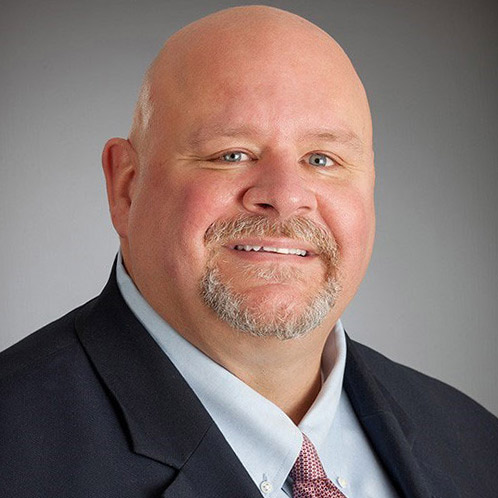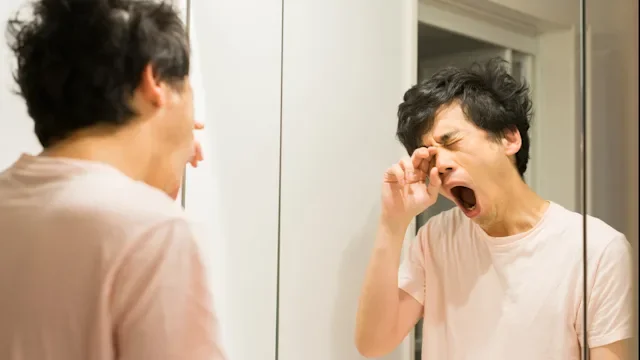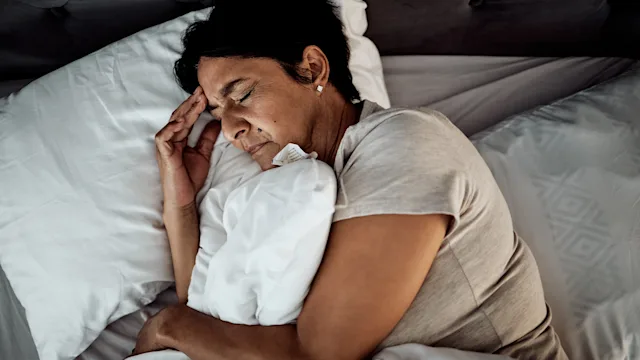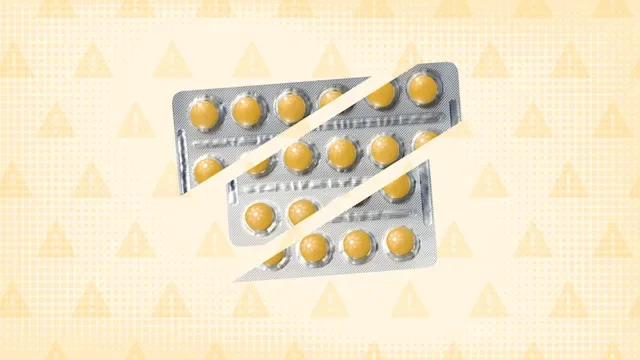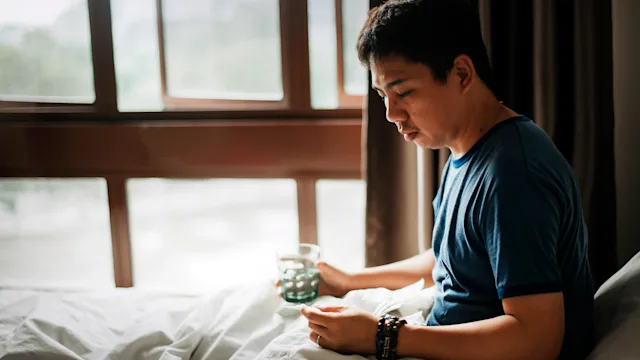Key takeaways:
Insomnia is a common sleep disorder that can affect your ability to fall asleep, stay asleep, or get quality sleep.
Insomnia can lead to physical problems such as high blood pressure, heart disease, diabetes, and cancer.
While there’s no cure-all for insomnia, different solutions work for different people.
Insomnia doesn’t just result in anxious nights. Lack of sleep impacts every part of your day, leading to emotional irritability, mental lapses, and physical exhaustion.
And make no mistake, insomnia is a health hazard. Not getting enough sleep raises your risk of high blood pressure, coronary heart disease, diabetes, cancer, and other serious physical concerns.
But rest assured: From medicines to mind games, there are endless solutions for better sleep. Here are three people who have managed to conquer insomnia and finally get a good night’s sleep.
Search and compare options
Self-hypnosis is her answer to insomnia
Stephanie Dalfonzo was working as morning show DJ “Stevie Knox” in Portland, Oregon, when her lack of sleep turned her life upside down.
“This was the mid-’90s,” she says. “I was doing the morning show. My kids were young, my husband was traveling, and I was getting up at like 3:30 in the morning. I developed insomnia. It was awful, absolutely awful. I could not function.”
A visit to her healthcare provider led to a diagnosis of anxiety and an Ambien prescription.
“It worked,” she says. “But then it stopped working … and then things were even worse because now I was spiraling out of control because I felt there was nothing I could do.”
This fed her anxiety and left her feeling desperate. She visited her local library to research solutions.
“This was at the very beginning of the internet, so you couldn’t just Google stuff,” she says. “I was checking out cassette tapes and magazines. I learned about the emotional freedom technique, which is like acupuncture without needles. I was able to start calming myself down.”
From there, Stephanie — now 63 and living in Danbury, Connecticut — began to explore hypnosis, which ultimately became her answer to insomnia. She’s since become a certified hypnotist and written a book about how she overcame her anxiety.

“Hypnosis is a naturally occurring phenomenon,” she says. “If you've ever driven somewhere and you get there, and you don't remember the drive, you were in a state of hypnosis. Because you were simply in this focused state of awareness where your conscious mind was off thinking about whatever, but your subconscious mind — and that’s where the real power is in our brain — that helps you keep driving safely.”
She eventually taught herself to use self-hypnosis for sleep. Stephanie uses counting to reach a state of hypnosis. She breathes deeply, counting each inhale and exhale, up to eight and then back down to one — repeating until she drifts off to sleep.
“Your conscious mind is totally focused on [the counting] instead of focusing on the fight you had with your spouse earlier in the day or the dreaded meeting with your boss tomorrow,” she says.
Stephanie doesn’t just use it at night, though. When she first started, she’d prepare snacks for her kids when they arrived home from school, take care of other duties, then take a break.
“Through hypnosis, I was able to let myself go to sleep for 20 minutes and then wake up feeling as rested as if I’d had 8 hours sleep,” she says. “It was absolutely amazing to me.”
It works, she says, because it is a learned behavior.
“Once you get into the pattern of having sleep issues, you create neural pathways in your brain,” she says. “‘It is hard for me to go to sleep. It takes Ambien or whatever for me to go to sleep.’ That becomes the neural pathway. You have to create better neural pathways to allow you to easily sleep again. For me, learning self-hypnosis and being able to quickly fall asleep and sleep deeply and restfully for 20 minutes was a breath of fresh air.
She cautions that self-hypnotism takes an open mind and practice.
“I don't want to make it oversimplified,” she says. “Just, you know, ‘Go to your happy place and you’ll drift off to sleep.’ I don’t want to give false hope. In our society, such a fast-paced society and getting faster by the day, we want to do it one time and it’s perfect. It doesn’t work that way. You practice it, and then you practice it some more.”
CBD helps her sleep for hours
Roberta Elder’s insomnia goes back about 20 years. She attributes some of her sleep problems to multiple back operations and a fight with thyroid cancer.
“I’m envious when people talk about sleep and [I’m] exhausted when I talk about my own sleep, or lack thereof,” says Roberta, who’s 46 and lives in Vista, California.
“If I was lucky, I would get 4 hours of sleep a night. And it certainly wasn’t consecutive.”
Roberta has tried many remedies along the way, including Ambien, melatonin, supplements, and Nyquil PM.
She has also tried meditation, calming music or other soothing sounds, and blackout curtains in her room.
“I’d just kind of always end up getting into my head,” she says.
While researching cannabidiol, or CBD, products for her back problems and her cancer, she discovered that different strains of cannabinoids are especially good for helping with sleep.

Importantly, the products were legal and produced no psychotropic (mind-alerting) effects.
About a year ago, she experimented with a tincture, which is a CBD extract dissolved in ethanol and taken in liquid form.
“I stumbled on CBD as a sleep alternative,” she says. “I found that if I take a dose in the evening, it really helps me to fall asleep and to stay asleep. For me, it’s multifaceted, dealing with body pains, as well as getting a restful sleep.”
It didn’t leave her feeling groggy in the morning, either.
She became such a believer that she joined the industry. Now, Roberta works in product development and operations at a cannabis health and wellness company. She encourages others to do their due diligence on CBD products and not get hung up on the stigma.
“It's definitely been a game-changer,” she says. “I notice now if I don’t take it for 2 days, I can definitely feel a difference in my body.”
Morning sunshine leads to evening sleep
For Margaret Stone, fighting insomnia starts minutes after she wakes up.
“Of all the things I do [to deal with insomnia], the sunlight in the morning is the biggest,” she says. “It is unbelievable. Give it a week and you should notice results.”
Margaret, a 33-year-old food and wellness coach in Dallas, takes a multipronged approach to dealing with insomnia. Her busy lifestyle led to “racing thoughts” at night that kept her up.
“I lay there in bed forever, and I wouldn’t be able to fall asleep, or I would fall asleep and then I’d be waking up at like 3AM with an inability to fall back asleep,” she says.
She tried over-the-counter solutions such as melatonin and diphenhydramine (Benadryl).
“The grogginess when I would wake up with — that was ridiculous,” she says. “I might as well not sleep.”

Eventually, Margaret began listening to her body.
She says she sets her circadian rhythm by getting at least 15 minutes of sunlight in the morning.
“That helps me to naturally set that rhythm right when I wake up in the morning,” she says. “My body is learning that this is the daytime.”
She also doesn’t bring her phone into her bedroom.
“It’s difficult. Sometimes you want to be on your phone before bed. I do not like to expose myself to blue light or any real light stimulation. I want to be calming my mind,” Margaret says.
Her approach to bedtime has changed. She makes a conscious decision not to think of other things but sleep. It is a psychological technique.
“I made a decision that lying in bed was my peace, that it was a gift that I’m giving to myself where I do not have to think or worry or plan or do anything,” she says. “This is literally like my spa moment.”
And if she does have trouble falling asleep, Margaret gets out of bed.
“We don’t want to train our body that other things can be done in bed, like working in bed or just lying awake and thinking in bed,” she says. “Bed is for sleeping.”
What does the doctor say?

Patricia Pinto-Garcia, MD, MPH
Medical Editor
A good night’s sleep is a powerful thing. It’s restorative for your mind and body. But when you don’t get enough sleep, it can throw your life into disarray. And there’s probably nothing more frustrating than lying in bed knowing you need to fall asleep and not being able to drift off.
Research shows that 1 in 3 adults report sleeping less than 7 hours per night. If you’re one of those people, or you have trouble sleeping, talk to your healthcare provider or a sleep specialist. Like many medical conditions, insomnia can vary from person to person. The reasons you’re having trouble sleeping may not be the same as someone else’s. Most people experiencing insomnia have another sleep-related condition or another health condition that’s triggering it. Getting to the root of the triggers is your first step to consistent sleep.
While general sleep hygiene measures — like avoiding screens before bedtime and keeping your room dark — are always a good idea, long-lasting ways to improve your sleep quality will depend on your specific situation. Self-management tools like meditation can also help. Medications and supplements may be a part of your sleep plan. But you want to make sure you use these safely. Even natural sleep aids aren’t meant to be used long term. Developing a long-term plan that addresses the causes of your insomnia will ensure that you can get a good night’s rest.

Why trust our experts?
